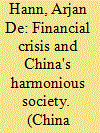| Srl | Item |
| 1 |
ID:
193024


|
|
|
|
|
| Summary/Abstract |
The Republic of Korea Government implemented a universal consumption subsidy program to combat the coronavirus disease 2019 (COVID-19) economic downturn in 2020. Using granular, micro-level transaction data, we find that the subsidy scheme has stimulated household consumption immediately after receipt. Moreover, lower income groups demonstrate higher marginal propensity to consume than middle and higher income groups; this holds true even when creating synthetic control groups that model rational spending behavior. This can have a significant implication on the effectiveness of fiscal impulse. Using income and average historical credit card spending, we also demonstrate credit and liquidity constraints are major factors affecting consumption responses.
|
|
|
|
|
|
|
|
|
|
|
|
|
|
|
|
| 2 |
ID:
097381


|
|
|
| 3 |
ID:
117803


|
|
|
|
|
| Publication |
2012.
|
| Summary/Abstract |
The twin-deficits theory has intrigued economists and policy-makers alike for the past few decades. In a Keynesian economy, budget deficit increases the absorption of the economy, causes import expansions, and thereby, worsens the trade deficit. It also causes domestic interest rates to rise, domestic currency to appreciate, and thereby, contributes to trade deficits. However, according to the Ricardian Equivalence Hypothesis (REH), rising budget deficits imply higher future tax liabilities so people would save more and consume less. As a result, an inter-temporal shift between taxes and budget deficits would have no impact on the real interest, or the trade deficit. Thus, the issue of whether the twin-deficits phenomenon holds becomes more of an empirical question, and the recent fiscal expansions to curb recession makes it timely to revisit the phenomenon, especially for the developing countries confronting both the deficits on a chronic basis. To this end, we make a case study of India, using the bounds- testing approach to cointegration and error-correction modelling on monthly and quarterly data over 1998-2009. Our results suggest that the twin-deficits theory holds for India in the short-run (validating the Keynesian channel) but not in the long-run (validating the REH).
|
|
|
|
|
|
|
|
|
|
|
|
|
|
|
|